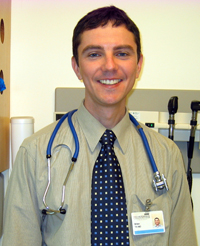Mar 17, 2011
 |
In the Q&A that follows, Dr. Till provides an update on his award-winning research project: “A Phase I Study to Evaluate the Safety and Feasibility of Cellular Immunotherapy Using Genetically Modified Autologous CD20-Specific T Cells for Patients with Relapsed or Refractory Mantle-Cell and Indolent B-Cell Lymphomas.”
AC: What were the outcomes of your YIA research project?
Dr. Till: In this clinical trial, four patients were enrolled and three received infusions of autologous, ex-vivo expanded T-cells that had been genetically modified to express a CD20-specific chimeric antigen receptor that contained CD28 and CD137 costimulatory domains. Patients also received cyclophosphamide lymphodepleting chemotherapy prior to the first infusion, and 14 days of low-dose Interleukin-2 (IL-2) injections after the infusions. In general, patients tolerated the infusions well, although one patient developed transient fever and hypoxia after the infusions. After receiving cyclophosphamide, T-cell infusions, IL-2, and an excisional lymph node biopsy, one patient remains in a complete remission for 16 months so far, another patient had no evaluable disease after treatment but relapsed 12 months after the infusions, and the third patient had an objective partial remission lasting six months so far.
AC: How has the YIA impacted your career?
Dr. Till: The YIA was an important part of my early post-fellowship career and allowed me to have protected research time to generate the preliminary data and publications that led to a larger grant. It is difficult to compete for more durable grants immediately after fellowship, and thus smaller grants targeted towards junior investigators are very important.
AC: What are you currently working on?
Dr. Till: I am continuing to complete the correlative experiments for the clinical trial described above, specifically assays to test for humoral or cellular immune responses against the genetically modified cells and quantitative PCR [polymerase chain reactions] to assess the duration of in vivo persistence of the infused cells. I hope to begin other lab-based experiments soon to look for ways to improve upon our results so far, with the goal of translating these findings into another clinical trial within the next few years.
Visit conquercancerfoundation.org to learn more about the breakthrough research that is being funded and to discover how the Conquer Cancer Foundation Grants & Awards community is working to create a world free from the fear of cancer.
